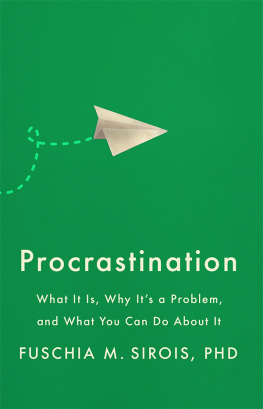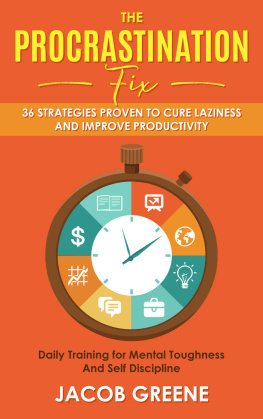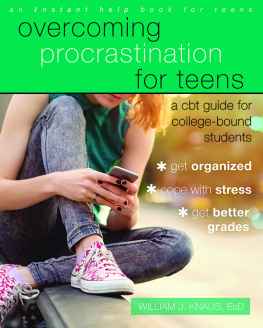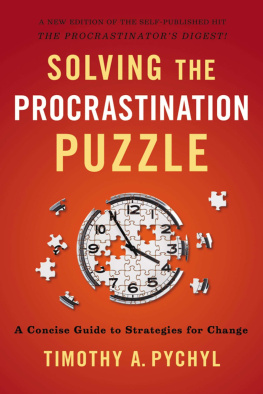Student Procrastination
www.palgravestudyskills.com the leading study skills website
Palgrave Student to Student
How to Get a FirstMichael Tefula
Student Brain FoodLauren Lucien
Student ProcrastinationMichael Tefula
Studying as a ParentHelen Owton
University LifeLauren Lucien
You may also be interested in the following study titles by Palgrave Macmillan:
14 Days to Exam SuccessLucinda Becker
Brilliant Writing Tips for StudentsJulia Copus
Cite Them Right (9th edn)Richard Pears and Graham Shields
Critical Thinking Skills (2nd edn)Stella Cottrell
Dissertations and Project ReportsStella Cottrell
The Exam Skills Handbook (2nd edn)Stella Cottrell
Getting CriticalKate Williams
How to Use Your Reading in Your Essays (2nd edn)Jeanne Godfrey
How to Write Better Essays (3rd edn)Bryan Greetham
How to Write Your Undergraduate DissertationBryan Greetham
The Palgrave Student PlannerStella Cottrell
Planning Your EssayJanet Godwin
Reading and Making NotesJeanne Godfrey
Referencing and Understanding PlagiarismKate Williams and Jude Carroll
Reflective WritingKate Williams, Mary Woolliams and Jane Spiro
Skills for Success (2nd edn)Stella Cottrell
Study Skills ConnectedStella Cottrell and Neil Morris
Success in Academic WritingTrevor Day
The Study Skills Handbook (4th edn)Stella Cottrell
Time ManagementKate Williams and Michelle Reid
The Undergraduate Research HandbookGina Wisker
For a complete listing of all titles in our Study Skills range please visit www.palgrave.com/studyskills
Student Procrastination
Seize the Day and Get More Work Done
Michael Tefula


Michael Tefula 2014
All rights reserved. No reproduction, copy or transmission of this publication may be made without written permission.
No portion of this publication may be reproduced, copied or transmitted save with written permission or in accordance with the provisions of the Copyright, Designs and Patents Act 1988, or under the terms of any licence permitting limited copying issued by the Copyright Licensing Agency, Saffron House, 6-10 Kirby Street, London EC1N 8TS.
Any person who does any unauthorized act in relation to this publication may be liable to criminal prosecution and civil claims for damages.
The author has asserted his right to be identified as the author of this work in accordance with the Copyright, Designs and Patents Act 1988.
First published 2014 by
PALGRAVE MACMILLAN
Palgrave Macmillan in the UK is an imprint of Macmillan Publishers Limited, registered in England, company number 785998, of Houndmills, Basingstoke, Hampshire RG21 6XS.
Palgrave Macmillan in the US is a division of St Martins Press LLC, 175 Fifth Avenue, New York, NY 10010.
Palgrave Macmillan is the global academic imprint of the above companies and has companies and representatives throughout the world.
Palgrave and Macmillan are registered trademarks in the United States, the United Kingdom, Europe and other countries
ISBN: 9781137312457
This book is printed on paper suitable for recycling and made from fully managed and sustained forest sources. Logging, pulping and manufacturing processes are expected to conform to the environmental regulations of the country of origin.
A catalogue record for this book is available from the British Library.
A catalog record for this book is available from the Library of Congress.
Printed in China
Contents
Preface
When I was given the opportunity to write a book on student procrastination, I wondered whether I could take up the challenge. After all, I am not a professor of psychology, nor am I someone who never procrastinates. In fact, I struggled with procrastination both at university and in my subsequent professional studies.
With that said, I consider these weaknesses to be strengths too, because I have approached this book from the perspective of someone who frequently has to overcome procrastination, as opposed to someone who has never had an issue with putting things off. So, how did I end up here?
At university, I was faced with the same distractions and temptations all students face but fortunately managed to minimise procrastination to a level that allowed me to graduate with a first. I subsequently had to dig deeper in terms of focus and willpower to write my debut book, How to Get a First: Insights and Advice from a First-class Graduate.
Upon graduation, I secured a job to train as a chartered accountant in the world of corporate finance where I was, yet again, faced with a large number of exams and revision to do over the course of my training contract.
To date, I have six years behind me of university and professional studies, and as well as having authored two books, I have had my fair share of project work, deadlines, time pressure, and productivity issues. With this book, I hope some of my experiences, research and insights will save you from the difficulties I faced when trying to get things done!
Introduction
A curious case of procrastination
Its 8.30 a.m. on Tuesday and Emily is trembling with fear. The ensuing panic and bewilderment as to where all her time went, along with the crash that follows the gobbling up of cheap energy drinks, cant be helping.
However, time pressure usually leads to an adrenaline boost and, despite the frenzy, Emily now has a renewed sense of focus and purpose: to bash out and proofread the last 500 words of a 3,000-word essay she has been writing since Monday morning all within 20 minutes.
The essay is due at 9.00 a.m. on the day. By finishing at 8.50 a.m. Emily will be able to print off the essay, submit a soft copy online, and rush off to the Law School to submit a hard copy.
Fortunately, she makes it in the nick of time and submits the coursework before the deadline. This is the last time I will leave things till late, she tells herself. Strange as it may seem, Emily also got a bit of a buzz from the drama that commenced as a result of leaving things till the last minute.
Perhaps Emily enjoys working under pressure. The last time she submitted coursework this late she got 67 per cent, nearly a first. Or does the buzz of working under pressure only appeal if followed by a big sigh of relief at having managed to successfully meet a deadline? Regardless, things arent looking so good this time round.
In the final hours of her deadline, Emily lost the big picture in her essay as she raced to submit the work on time. The essay was flimsy, at best, and rushing through it was a disservice to her ability to produce intelligent and creative work. What was she thinking? Ample time was given (a whole four weeks) in which to complete the essay, yet here she was, worrying whether she had done enough to even scrape a pass.
Next page








